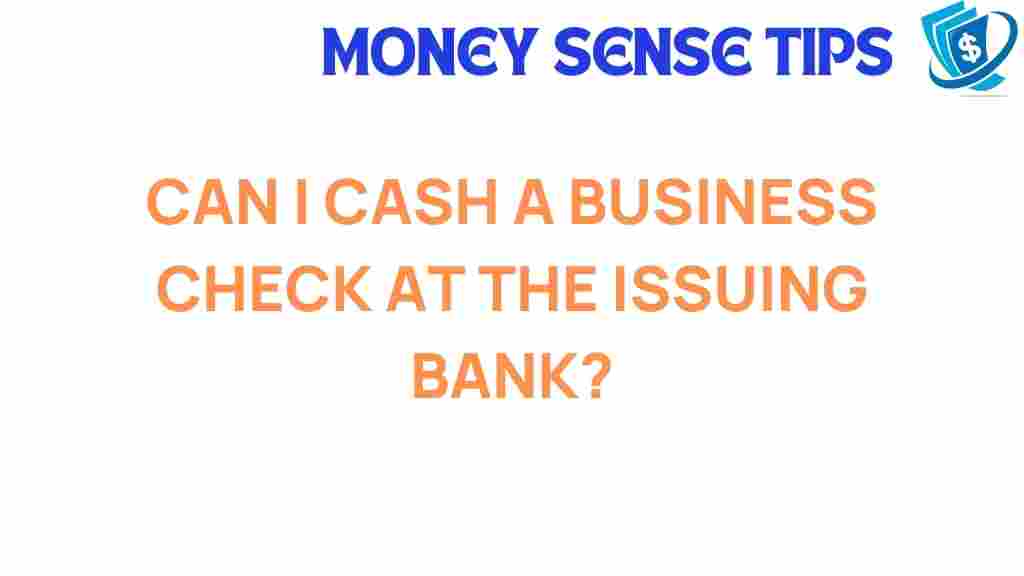Unlocking the Mystery: Can You Cash a Business Check at Its Bank?
When it comes to managing business finances, checks are a common payment method. However, many business owners and employees often find themselves wondering about the best ways to handle checks, particularly business checks. A frequent question arises: can you cash a business check at its bank? In this article, we will explore the intricacies of cashing a business check at its issuing bank, delve into banking policies, check cashing options, and provide insight into the broader context of business finance.
Understanding Business Checks
Before we dive into the specifics of cashing business checks, it’s essential to understand what they are. A business check is a payment method issued by a business to pay for goods or services. They can be used for various transactions, including payroll, vendor payments, and more.
Why Cashing a Business Check Matters
Cashing checks is a critical aspect of managing business finances. Whether it’s to cover immediate expenses or to keep the cash flow steady, knowing the proper procedures can save time and prevent potential issues. Here are some reasons why understanding the process is vital:
- Cash Flow Management: Quick access to funds helps maintain liquidity.
- Convenience: Cashing checks at the issuing bank can often be more straightforward.
- Security: Cashing checks at a familiar bank reduces the risk of fraud.
Can You Cash a Business Check at Its Bank?
The short answer is yes, you can typically cash a business check at its issuing bank. However, certain banking policies and rules apply. Let’s explore the process step-by-step.
Step-by-Step Process to Cash a Business Check
Here’s how to cash a business check at its bank:
- Visit the Issuing Bank: Go to the branch of the bank where the business account is held. This is essential as most banks will only cash checks for accounts they maintain.
- Provide Identification: Present valid identification. Most banks will require a government-issued ID, such as a driver’s license or passport. If you are an employee cashing the check, it may also be beneficial to have a letter from your employer authorizing the transaction.
- Endorse the Check: Ensure the check is properly endorsed. The business should sign the back of the check, and you may also need to sign it if you are cashing it personally.
- Fill Out Deposit Slips (if necessary): Some banks may require you to fill out a deposit slip even for cashing checks.
- Complete the Transaction: Hand over the check and your ID to the teller. They will process the transaction and provide you with cash or deposit it into your account.
Understanding Banking Policies and Rules
While cashing a business check at its issuing bank is generally straightforward, there are a few factors to consider regarding banking policies:
- Account Holder: Banks often prefer that the check is cashed by the individual or entity associated with the account. If you’re not an authorized signer, you may face difficulties.
- Availability of Funds: The bank may place a hold on the check depending on the amount and their policies regarding large transactions.
- Fees: Some banks may charge a fee for cashing checks, especially if you are not an account holder.
Alternative Check Cashing Options
If you cannot cash the check at the issuing bank, there are alternative methods:
- Check-Cashing Stores: These stores specialize in cashing checks for a fee. Ensure you understand the fees involved, as they can be quite high.
- Retail Locations: Some major retailers offer check cashing services. Similar to check-cashing stores, be mindful of the fees.
- Bank Account Deposit: You can deposit the check into your bank account and wait for it to clear before accessing the funds.
Common Troubleshooting Tips
Even with the proper steps, you may encounter issues when trying to cash a business check. Here are some tips to navigate potential problems:
1. Insufficient Identification
If you forget your ID or have an expired one, you won’t be able to cash the check. Always carry a valid government-issued ID when visiting the bank.
Only authorized individuals should attempt to cash the check. If you are not listed on the business account, you may need to get a signature or authorization from an authorized signer.
3. Large Check Amounts
For larger checks, the bank may put a hold on the funds. It’s wise to ask about any holds before cashing.
4. Business Check Endorsement
Ensure the check is correctly endorsed. If the business check is not signed by an authorized person, it may not be honored.
Conclusion
Cashing a business check at its issuing bank can be a convenient way to access funds quickly. By understanding the necessary steps and being aware of the banking policies involved, you can streamline the process and avoid common pitfalls. Whether you are managing your business finances or are an employee cashing a check, knowing your options can save time and enhance your financial operations.
For more information on check cashing and banking rules, you can visit this financial services resource. Additionally, if you’re looking for alternatives to cashing checks, consider checking out this guide on payment methods.
By being informed and prepared, you can effectively manage your business finance needs and make the most of the financial services available to you.
This article is in the category Services and created by MoneySenseTips Team
